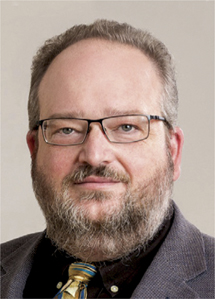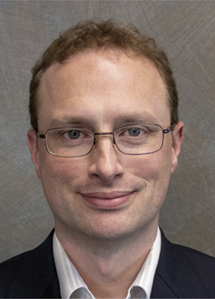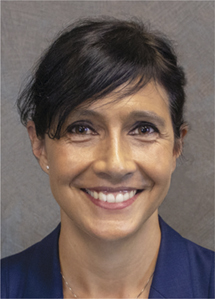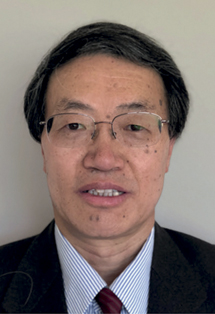The Meeting Chairs for the 2020 Materials Research Society (MRS) Fall Meeting are Michael E. Flatté (The University of Iowa, USA), Michael P. Rowe (Toyota Research Institute of North America, USA), Sabrina Sartori (University of Oslo, Norway), Prasad Shastri (University of Freiburg, Germany), and Chongmin Wang (Pacific Northwest National Laboratory, USA). The Meeting will be held November 29–December 4, 2020, in Boston, Mass.

Michael E. Flatté is a professor in the Department of Physics and Astronomy at The University of Iowa (UI). His research interests include optical and electrical control of spin dynamics in materials, novel spintronic devices, quantum sensors, and solid-state realizations of quantum computation. He received an AB degree in physics from Harvard University in 1988 and a PhD degree in physics from the University of California, Santa Barbara (UCSB) in 1992. After postdoctoral work at the Institute for Theoretical Physics at UCSB and in the Division of Applied Sciences at Harvard University, he joined the faculty at UI in 1995. He was director of UI’s Optical Science and Technology Center from 2010 to 2017. Flatté has more than 200 publications and 10 patents. He is a Fellow of the American Association for the Advancement of Science and of the American Physical Society (APS), a member of MRS, The Optical Society, and the American Vacuum Society, and was chair of the Division of Materials Physics of APS from 2016 to 2017. Flatté also has an adjunct appointment as professor in the Department of Applied Physics at Eindhoven University of Technology in The Netherlands.

Michael P. Rowe is a principal scientist at the Toyota Research Institute of North America, having joined Toyota’s North American Research and Development operations in 2008. He received his BA degree in chemistry from Knox College and MS and PhD degrees in chemistry from the University of Michigan, continuing with his postdoctoral research also at the University of Michigan. His work focuses on using bottom-up chemical approaches to control nanomaterial properties so that original futuristic ideas can become real-world applications. His current research programs span a broad range of fields, including lightweight steel composites to reduce environmental affects through improved vehicle fuel economy, and artificial muscle, soft robotics to improve the quality of life for elderly and disabled people. Rowe has received four Toyota Research Division Awards for his research accomplishments. He and his teams have generated more than 40 patents, in addition to numerous conference presentations and peer-reviewed publications.

Sabrina Sartori is an associate professor and leader of the Energy Systems section in the Department of Technology Systems at the University of Oslo. Her research interests include materials for energy storage and conversion and their characterization via in situ and operando synchrotron and neutron radiation experiments. She earned her MSc degree in chemistry from the University of Padova and PhD degree in materials science and engineering from the University of Bologna. She has held research positions at the University of Padova and the Institute for Energy Technology in Norway, before joining the University of Oslo in 2013. Sartori serves on the MRS Bulletin Energy Quarterly Board, served on the MRS Board of Directors (2015–2017), and currently serves as an expert and leader on several national and international committees, boards, and initiatives.

Prasad Shastri is a professor at the University of Freiburg, Germany, where he holds the Hermann Staudinger Chair for Biofunctional Macromolecular Chemistry and the BIOSS Professorship of Cell Signaling Environments. He is also the director of the Institute for Macromolecular Chemistry and one of the core faculty at the BIOSS Center for Biological Signaling Studies, which is one of the national clusters of Excellence in Germany. He received his PhD degree in chemistry from Rensselaer Polytechnic Institute in 1995, and carried out postdoctoral work with Robert Langer at the Massachusetts Institute of Technology. Shastri has published more than 120 peer-reviewed papers and has authored several proceedings articles, extended abstracts, and book chapters. He has also authored more than 50 issued and pending patents in materials science, regenerative medicine, and tumor biology. His laboratory is active in the development of biomaterials for controlling cellular microenvironments, in vivo engineering of tissue, intracellular delivery, cancer therapeutics, cancer biology, 3D-bioprinting, bioink development, and functional imaging.

Chongmin Wang is a Laboratory Fellow at Pacific Northwest National Laboratory (PNNL), and his research interests include S/TEM imaging and spectroscopy and their application to materials characterization, especially in situ and operando S/TEM techniques for energy materials. He received his BSc and MSc degrees in physics from Lanzhou University in China and a PhD degree in materials science and engineering from the University of Leeds, UK. He has received the 2016 MRS Innovation in Materials Characterization Award, the 2017 PNNL Laboratory Director’s Award for Exceptional Scientific Achievement, the 2016 Journal of Materials Research (JMR) Paper of the Year Award, the R&D 100 Award, the Rowland Snow Award from The American Ceramic Society, the Japanese Outstanding Invention Award from the Ministry of Science and Education of Japan, and the PNNL Exceptional Contribution Award. Wang has published 370 journal papers and several book chapters and has delivered 70 invited talks. He currently serves as a principal editor of JMR and is a Fellow of MRS.


